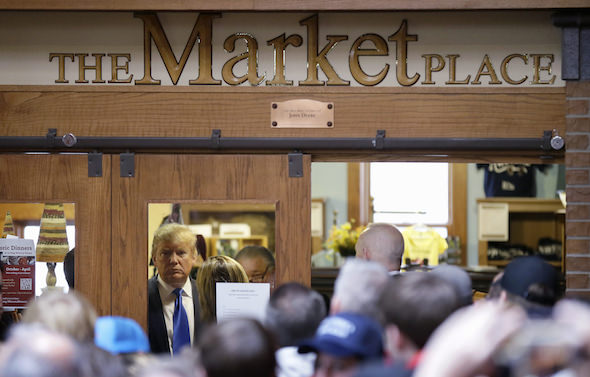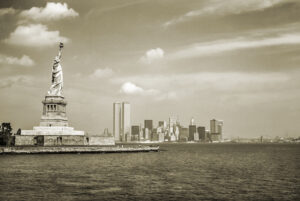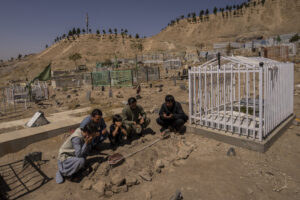Thanks to Donald Trump, Police Brutality and Guns, the United States’ Reputation Is Plummeting
When I was visiting abroad recently, my non-American friends were quite candid with me: They see my country as increasingly intolerant, violent and inhospitable.
Donald Trump’s bewildering popularity in the presidential race has been exceedingly hard to bear for many Americans, particularly those who belong to one or more of the communities that he openly disparages, like African-Americans and Muslim Americans.
Yet if even some citizens wrestle to make sense of Trump’s rise to power, how do non-Americans view the strange state of politics in the world’s most powerful nation?
While on a recent visit to Dubai, United Arab Emirates — where I was born and raised and where my parents still live — Trump’s name cropped up as a topic of conversation within the first few minutes of nearly every interaction I had, so I decided to gather a group of my friends together to answer that question.
Dubai is home to myriad immigrant communities, and while the city of more than 2.4 million struggles with its own unique social problems, the United States remains hugely influential there when it comes to both pop culture and politics.
Carlo, an Italian friend, told me that he finds Trump’s popularity troubling. “It doesn’t look good,” he said, shaking his head as he uttered the vague words, perhaps worried that he might insult the American in me if he said more.
To my Dubai friends, the Trump phenomenon is tremendously fascinating, but they are not surprised by his meteoric ascension to the status of a viable presidential candidate. After all, the White House was occupied in recent memory by another bumbling, bigoted fool who loved to pander to religious extremists and wax bombastic. His name was George W. Bush, and he gave us the Afghanistan and Iraq wars and birthed the Department of Homeland Security while also becoming an unending source of macabre hilarity. Trump promises all of the above and much more.
Bush was sandwiched between two presidents of a far more civilized ilk — Bill Clinton and Barack Obama. But even under both of them, state violence — both domestic and international — have continued to thrive. Big banks have benefited at the expense of ordinary Americans; immigrants have faced a massive deportation campaign; African-Americans have seen lip service but no justice; and so on. The list is long.
However, Carlo said he liked Obama immensely. The United States’ first African-American president, he said, is relatable and even amid incessant attacks from right-wing opponents appears to rise above their petty politics.
I was surprised to learn that my international friends watch Fox News and that they clearly understand its ability to foment ignorance and hatred among Americans. But they also watch a wide variety of other media, including the BBC, Sky News, Al-Jazeera and RT, and they are well aware of how widespread racist discourse and violence remain.
Fatima, an Indian Muslim friend, said she wants to visit the U.S. but that her husband, Tarek, a Syrian, refuses. Why? “Islamophobia,” Tarek said simply. The single word said it all.
Middle-class liberal-minded immigrants in the UAE like my friends are not the only non-Americans who are disgusted by Trump. The Emirati billionaire Khalaf Al Habtoor, who had initially supported the American businessman, now says he regrets having done so. Al Habtoor has accused Trump of “creating a hatred between Muslims and the United States of America.”
In addition, billboards featuring Trump’s image advertising a golf-course development in Dubai were recently removed, leading some to conclude that “the Trump brand has become toxic.”
Preeti, also an Indian, confessed that she and Carlo, her husband, had planned a family vacation in the United States. The couple, who have two lovely olive-skinned sons, canceled their vacation because they were worried about racism. “I feared they would see her as ‘black’ and attack her,” Carlo said, pointing to his wife.
The couple and their sons speak English with accents and have skin tones of various shades, and they simply did not want to risk traveling to a nation that they now feel would not welcome them. Preeti even quoted another friend in Dubai who refers to the U.S. as “the devil’s own country.”
Obviously racism in the United States is an age-old phenomenon, but because there is increased awareness via social media, non-Americans may be getting a more accurate picture of contemporary U.S. society. And they don’t like what they see.
The group I gathered saw police brutality in the U.S. as equally appalling. As The Guardian newspaper has pointed out, “US police kill more in days than other countries do in years.”
A 2015 list compiled by a private consulting firm ranked the U.S. 22nd among the world’s most reputable countries. Canada occupied the top spot, and nations like Sweden, Australia, Finland and Thailand all ranked higher than the U.S., which came in just ahead of Poland and the Czech Republic.
In addition to the rampant racism, the widespread gun violence that plagues nearly every corner of the nation confounds my non-American associates. “There’s simply no gun control,” Preeti remarked. “It makes no sense!”
My friends spoke of the freedom with which Americans wield deadly weapons. They see it as bizarre and are unable to fathom how it can be acceptable in a modern society that is supposed to be civilized.
The remarks reminded me of an interaction that I had recently with an old high school friend who now lives and works in Paris with her family. She described feeling so shaken by the Nov. 13, 2015, attacks in her city — which claimed 130 lives — that she remained unable to visit her usual haunts. I responded by saying that living in the U.S. has inured me to random violence, that gun violence is so rampant across the nation that we now have to simply accept that there is a nonnegotiable risk of being shot every time we step outside our homes.
Fatima’s oldest daughter started university in the United Kingdom a few months ago. She told me that there was absolutely no way that she would have sent her daughter to the U.S. for higher education.
Decades ago, several of us at the gathering — including me — first entered the U.S. on student visas, eager to earn a degree from an American educational institution. But today, Fatima said she would send her daughter “anywhere but the U.S.”
There was a time when the United States enjoyed a reputation (however undeserved) for being the keeper of the world’s conscience, the standard-bearer of human rights and democracy. But now, it appears that that veneer is fading fast and that reality is seeping through to the outside world.
Your support matters…Independent journalism is under threat and overshadowed by heavily funded mainstream media.
You can help level the playing field. Become a member.
Your tax-deductible contribution keeps us digging beneath the headlines to give you thought-provoking, investigative reporting and analysis that unearths what's really happening- without compromise.
Give today to support our courageous, independent journalists.








You need to be a supporter to comment.
There are currently no responses to this article.
Be the first to respond.